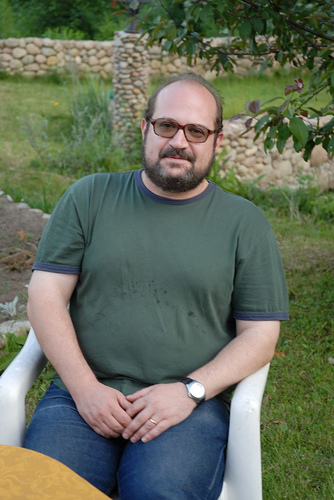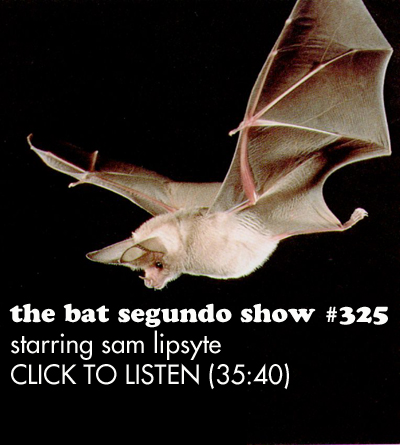Sam Lipsyte recently appeared on The Bat Segundo Show #325. Mr. Lipsyte is most recently the author of The Ask.
Condition of Mr. Segundo: Looking to ask someone for something.
Author: Sam Lipsyte
Subjects Discussed: Milo Burke as the obverse to Home Land‘s Lewis Miner (and common personality qualities), Lipsyte’s early draft of The Ask getting trashed by his wife, the importance of knowing a character’s job, Stanley Elkin, descriptive dichotomies within The Ask, oscillation between extremes and forward motion in the narrative, digressive impulses, movement by painting yourself into a corner, using linguistic attributes to create distinct dialogue, the plausibility behind student housing and cages, characters who share food, the innate sadness of wraps, breast milk bars, Lipsyte’s methods of collecting information and forgetting to write details down, writing without an outline, Lipsyte’s syllabic form of internal rhyme within sentences, Lipsyte’s previous career as a lyricist, the alternative verb phrases succeeded some sentences, characters who believe that writing a book will solve everything, the purpose of writing a comic novel in a serious age, the elevator pitch motif throughout Lipsyte’s work, Lipstye’s frequent references to Old Overholt and his efforts to get a free case, “home invasion” and Lipsyte’s use of stock phrases, “closed indefinitely due to pedagogical conflicts,” the origin of “toosh dev,” on not keeping notes, the question of whether or not there are any limits to literary movements of the penis, how sequences of events assist narrative, Gordon Lish’s principle of “all the book being the good part,” Lipsyte’s present status in relation to social networks, and Lipsyte’s present relationship with weapons.
EXCERPT FROM SHOW:
 Correspondent: I wanted to ask you about your sentences. You do something extremely interesting, and this syllabic form of internal rhyme. I’ll just give you a number of examples: “a tawny teen in a cocktail dress of skimpy hemp.” “I started to rub myself and, remembering I would have to retrieve Bernie soon, recalled that I’d once done what I was doing with Bernie in the room.” So there’s the oo, oo. The book’s opening line, of course: “Horace, the office temp, was a run-down and demented pimp.” So I’m curious whether these particular sounds serve as, I suppose, reference points in your mind to get a sentence right, whether this came from your previous career as a lyricist or possibly the Gordon Lish school rubbing off now after so many books and the like.
Correspondent: I wanted to ask you about your sentences. You do something extremely interesting, and this syllabic form of internal rhyme. I’ll just give you a number of examples: “a tawny teen in a cocktail dress of skimpy hemp.” “I started to rub myself and, remembering I would have to retrieve Bernie soon, recalled that I’d once done what I was doing with Bernie in the room.” So there’s the oo, oo. The book’s opening line, of course: “Horace, the office temp, was a run-down and demented pimp.” So I’m curious whether these particular sounds serve as, I suppose, reference points in your mind to get a sentence right, whether this came from your previous career as a lyricist or possibly the Gordon Lish school rubbing off now after so many books and the like.
Lipsyte: Well, certainly, if there’s a direct rhyme there, I’d be sorry to see it. But I am interested in words that are close to each other, bouncing off of each other, colliding, creating various assonances, and such. I’m very aware of the acoustic properties of the sentences. And I listen to them. And I like to see those different elements playing off of each other. The different sounds. Just on the level of the morpheme or whatever. But, yeah, I think that I was always conscious of it. I think that studying with Gordon Lish made me understand that you could extract some power and attention to the sounds in your sentences. And I don’t know what I was doing a a lyricist, to be quite honest.
Correspondent: (laughs)
Lipsyte: I was screaming cryptic lines that couldn’t be heard because the guitars were too loud. (laughs)
Correspondent: (laughs) Maybe this was part of the syllabic quality.
Lipsyte: Yeah, exactly.
Correspondent: But I’m curious. Why syllables more so than words? I mean, there’s also, I recall reading, “Touche, douche!” There’s that as well. But more often, it’s this syllabic ride as opposed to a full word, full tilt boogie.
Lipsyte: Well, I guess that’s how I work. I mean, it’s not a conscious choice. And I think I do it in larger units as well. Or try to. And I’m very much aware. I mean, people talk about sentences. But there’s no such thing even as a great sentence. It’s about which sentences are around it. So I think that I’m trying to work on several levels.
Correspondent: I also wanted to ask about another aspect of your sentences, which is this tendency — just when you think the sentence is over, then you add a comma and a verb phrase that’s appended at the end. It’s not quite a comma splice. It’s almost a kind of alternative verb phrase. I’ll offer again some examples for folks who are listening to this. Here’s one: “Now an old man with a ducktail haircut and rolled T-shirt sleeves sauntered by” — you think the sentence is over, but no — comma, “climbed into his wine-dark bearer.” Another one: “Maura did not speak, cut her lemon chicken into rectilinear bites.” And it’s more in this book than the other two novels. And I’m curious as to how this came about.
Lipsyte: I do it as well in my book of stories probably. I just like the way it speeds up rhythm. It changes rhythm. I like the jumpiness of it. And some people say, “Why can’t you just use a fucking ‘and?'” (laughs) And sometimes I do. But sometimes I don’t.
Correspondent: Does it present an almost alternative fate in that action? Is that the idea?
Lipsyte: Yeah. Or kind of compresses time a little bit. It does a few things. And I’ve been fond of it.
Correspondent: Two characters seem to believe that writing a book will cause them to find truth, or find a lucrative career. There’s Charles Goldfarb’s book, in which he tries “to advance a new approach to transcendentalism in the face of technology and interconnectivity.” And then, of course, when Carl at the Happy Salamander tells Milo and Denise to fuck off, he announces that, “I’ll write books!” So you said in a recent interview that you don’t know what the purpose is of writing a comic novel or whether it’s going to fulfill some greater need. But it’s interesting that this reticence is shared by your characters to some degree. And I’m curious if we’re overstating the importance of books or these characters are overstating the importance of books. Or whether this is, again, just a part of the great American compromise. Being a First World bitch or what not.
Lipsyte: I’m curious about my quote. Where I said something.
Correspondent: I read the interview and, regrettably, I failed to note it down before meeting you. I read this days ago. Where you were saying that you’re not sure if the comic novel can be important in any sense. But maybe I should just ask you. (laughs)
Lipsyte; (laughs) Right.
Correspondent: Maybe I hallucinated it. I don’t think I did.
Lipsyte: Well, I’m sure what I meant to say is: I don’t know how many people can see it as important. I do. I mean, I’m not talking about my book, but, in general, I think books that have a comedic element have been the books that have fired up my imagination. No, books are incredibly important to some segment of the population. I’m not trying to say otherwise.
Correspondent: Well, these characters. Going back to them. Their insistence that books will be a vocational savior. Is this a general spitball towards Americana? Or some larger….
Lipsyte: No, I think that there’s a certain delusion about what a book can do for you, as the author. As opposed to what it might do for readers.
Correspondent: I also wanted to ask you. Because Home Land and The Ask both feature variants on the elevator pitch. You have, of course, Miner’s adventure with that white rapper in the black mink suit.
Lipsyte: Right.
Correspondent: And in this, you have Purdy’s insistence that he can deliver the most perfect elevator pitch. I’m curious how the concern for elevator pitches came about. I mean, it’s a West Coast phenomenon more than an East Coast phenomenon. So that is rather interesting.
Lipsyte: Well, I heard the phrase — maybe first in 1991 from an East Coast person. Who was kind of a businessman. So I think it’s used in all sorts of commercial pursuits. But it’s always been kind of a delightful convention to me. Because here you are in this box with a clock running, and you have to say something that’s going to make somebody else feel something. (laughs)
Correspondent: I have a very important question to ask, and that is in relation to Old Overholt. Now in Home Land, there’s that moment in which there’s the effort by Teabag to get some product placement in there, so that he can get a case of Old Overholt. Now I’m reading this. And I see Old Overholt come up twice in the book. So I’m wondering if you have reached an arrangement with the folks at Old Overholt.
Lipsyte: I’m trying to get a free case. And if it’s going to take me three books, it will be three books. (laughs)
Correspondent: Have you tried contacting them directly?
Lipsyte: No.
Correspondent: No?
Lipsyte: There are always little threads I like to pull from book to book. Just to keep me a bit amused as I work. And I like the sound of Old Overholt. It sort of opens the oral cavity in a nice way.
Correspondent: In two ways, actually.
Lipsyte: So I’m certainly happy to keep naming it until somebody at that company notices.
(Image: Mephistofales)
The Bat Segundo Show #325: Sam Lipsyte (Download MP3)
